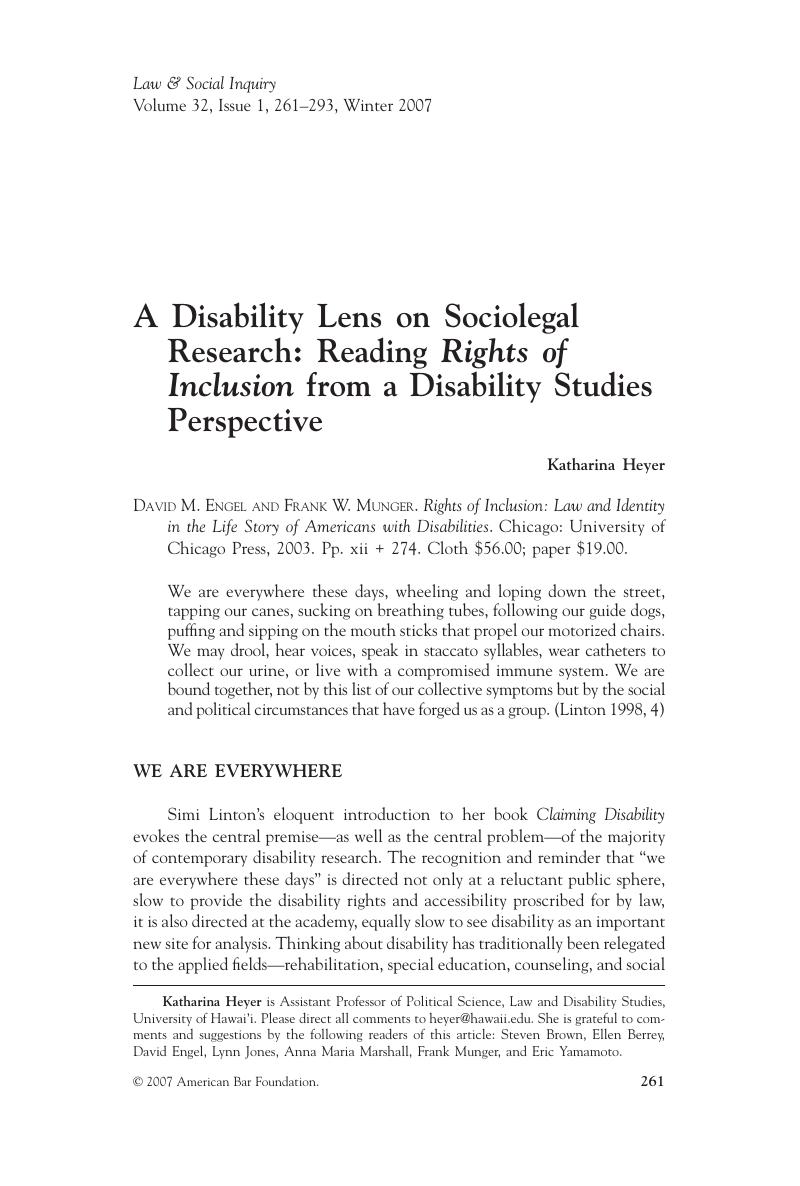Crossref Citations
This article has been cited by the following publications. This list is generated based on data provided by Crossref.
Berrey, Ellen
and
Beth Nielsen, Laura
2007.
Rights of Inclusion: Integrating Identity at the Bottom of the Dispute Pyramid.
Law & Social Inquiry,
Vol. 32,
Issue. 1,
p.
233.
Perlow, Ellen
2010.
Accessibility: Global Gateway to Health Literacy.
Health Promotion Practice,
Vol. 11,
Issue. 1,
p.
123.
Fyson, Rachel
and
Yates, Joe
2011.
Anti-social behaviour orders and young people with learning disabilities.
Critical Social Policy,
Vol. 31,
Issue. 1,
p.
102.
Heyer, Katharina
2011.
Special Issue Social Movements/Legal Possibilities.
p.
77.
Muñoz, Andrea Padilla
2011.
Inclusión educativa de personas con discapacidad.
Revista Colombiana de Psiquiatría,
Vol. 40,
Issue. 4,
p.
670.
Henderson, Julie
and
Battams, Samantha
2011.
Mental health and barriers to the achievement of the 'right to health'.
Australian Journal of Primary Health,
Vol. 17,
Issue. 3,
p.
220.
Zhang, Haomiao
2017.
The emergence of personalized service for disabled people in Sichuan Province, China.
International Social Work,
Vol. 60,
Issue. 4,
p.
815.
Evans, Heather D.
2019.
‘Trial by fire’: forms of impairment disclosure and implications for disability identity.
Disability & Society,
Vol. 34,
Issue. 5,
p.
726.
Lejeune, Aude
and
Ringelheim, Julie
2019.
Workers with Disabilities Between Legal Changes and Persisting Exclusion: How Contradictory Rights Shape Legal Mobilization.
Law & Society Review,
Vol. 53,
Issue. 4,
p.
983.
Revillard, Anne
2019.
Realizing the Right to Access in France: Between Implementation and Activation.
Law & Society Review,
Vol. 53,
Issue. 4,
p.
950.
2021.
Buchter, Lisa
2022.
Educating the sighted: When activists reorganize solidarity by prefiguring new social scripts of help and interaction.
Organization,
Vol. 29,
Issue. 2,
p.
247.
VanPuymbrouck, Laura
Magasi, Susan
and
Skouteris, Helen
2024.
Confronting Barriers to Equitable Care: A Qualitative Analysis of Factors That Inform People with Mobility Disabilities’ Decisions to Self‐Advocate in the Context of Healthcare.
Health & Social Care in the Community,
Vol. 2024,
Issue. 1,
Dorfman, Doron
2024.
Empirical Disability Legal Studies.
Annual Review of Law and Social Science
,
Vol. 20,
Issue. 1,
p.
255.



